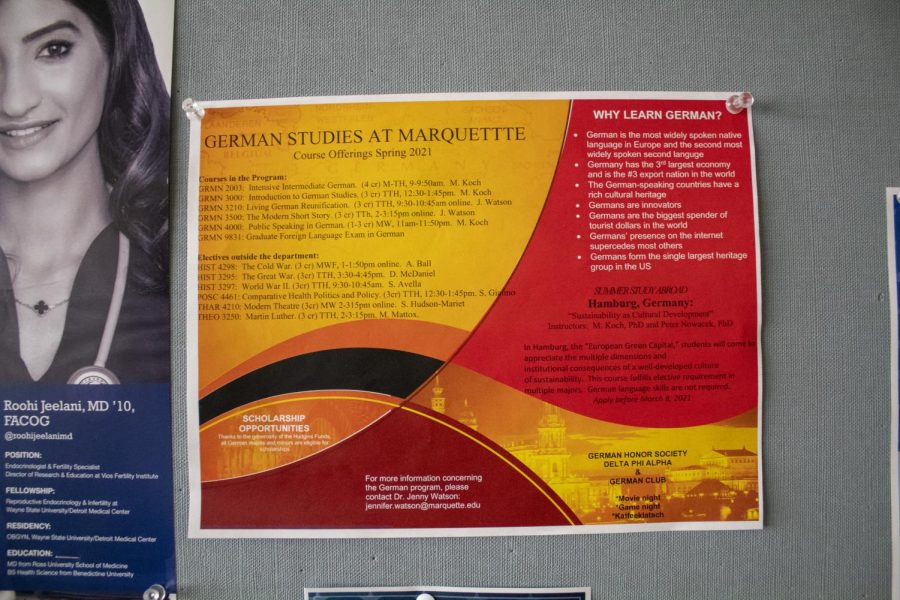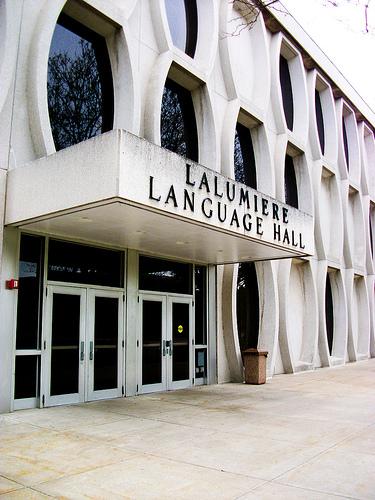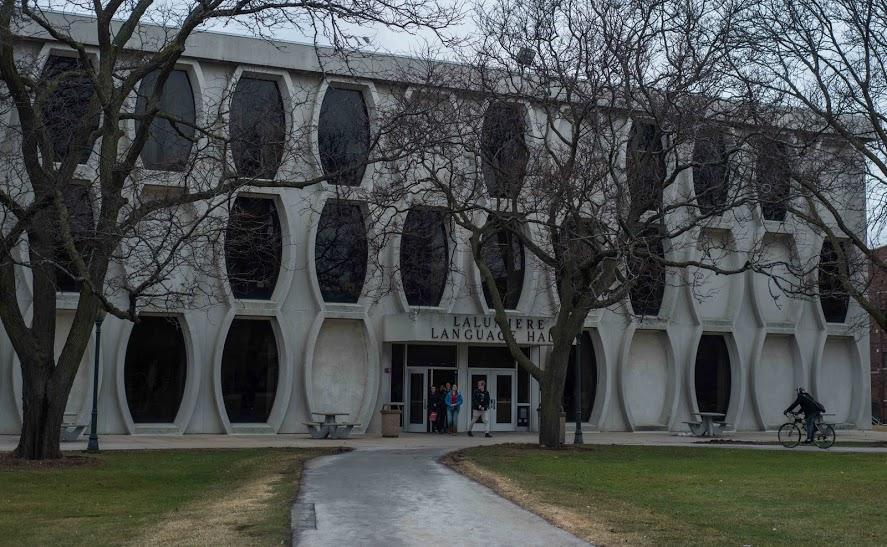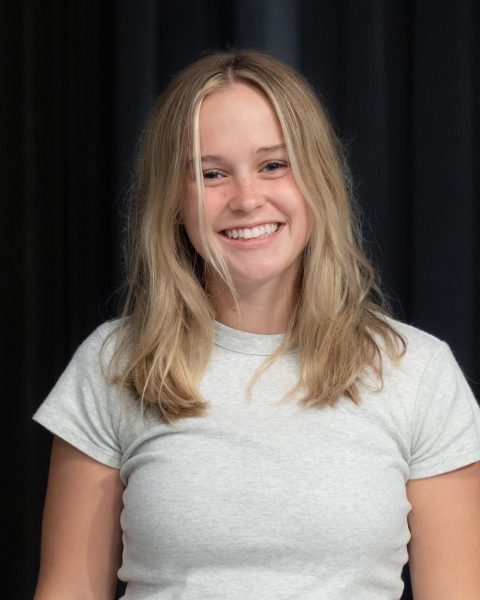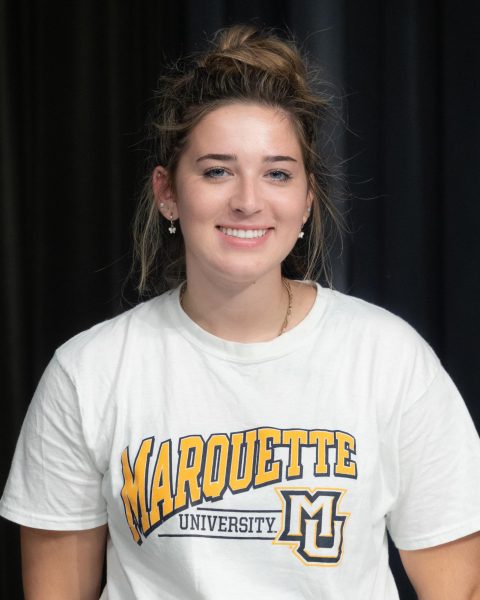John Su, vice provost for academic affairs, says the humanities are essential to helping students understand the world, but some professors think while the humanities are essential, there’s more Marquette can do to support them.
“The humanities are an essential part of a Jesuit education,” Su says, “They engage students in the enduring questions of our daily lives.”
Dawne Moon, a professor in gender and sexualities studies at Marquette, says that the departments in humanities are losing faculty. When she started working in social and cultural sciences, there were six tenured faculty just for sociology, but now there are two.
Moon says her area of study is lacking the resources they need to reach their full potential. She says Marquette doesn’t have an office or staff member specifically for gender and sexualities studies for students to come and ask questions about the majors and minors they offer.
“On the second floor of Lalumiere, there was an office, but it’s empty now. That used to be where you could just go and ask questions about gender and sexuality studies, and the center is on hiatus. It would be great if that suite could be the Center for Interdisciplinary Studies if it’s still available,” Moon says.
The current Center for Interdisciplinary Studies for the College of Arts & Sciences is located in Sensenbrenner Hall, 103.
Samantha Majhor, an assistant professor in English with a focus in Native American literature, expressed similar thoughts regarding the amount of available support.
“The English department, as with other departments in Arts & Sciences, has needed more support, more faculty hiring and ways to support the faculty that are here … For me, the biggest one is recommitting to race, ethnicity and indigeneity studies,” Majhor says.
Majhor works in the Center of Race, Ethnicity and Indigeneity Studies. When she was hired, she was told that the university was expanding this center, but she has seen challenges in that expansion actually taking place.
“I feel like we are not giving students the opportunities that one finds through those avenues of studies because we are not hiring faculty in that area,” Majhor says. “We’ve celebrated the fact that this latest class of students is the most diverse we’ve ever had. But, we really need to also shore up visibility of faculty of color within the faculty to meet the needs of all of our students.”
Cedric Burrows, associate professor in the department of English, also says he feels like there’s a deficit in resources for his department.
Burrows studies Black rhetoric, and he says along with reducing class sizes, Marquette should have a center that focuses on social justice alongside more funding.
When Burrows started at Marquette, his class sizes averaged around 15 students, but now his classes are reaching 30 students.
“I think smaller class sizes would help, especially since a lot of us are teaching writing. It’s harder to do with 30 students than, let’s say, 15. So when I first started here, a lot of upper-division writing classes were 15. So, you know, you can get to know students more. You can do a lot of activities in class, and you can really give them more in-depth feedback on their papers,” Burrows says.
Data gathered in 2020 found that Marquette’s student-to-faculty ratio is 13:1. The average upper-division classes were 25 students while the lower-division class average was 33.
“Cultivating empathy is really important in this world, and the President [Lovell] knows this and is very invested in that, and the humanities helps us to do that,” Moon says.
Burrows says if you are going to study business or nursing, the humanities curriculum would teach students how to communicate and achieve social justice.
“Let’s say you are thinking about buying a business in a low-income neighborhood: how it would affect the people around the area, or if you’re treating a patient to ask them about their stories, their backgrounds, so they could get a better quality of care,” Burrows says.
Burrows says the humanities are so essential because they teach students how to communicate across cultures and respect different cultural values that people bring into the workplace.
“In many ways our education tends to fail us on these topics, and that creates the destructiveness we see in our discourse. If we educate ourselves on these topics, histories (and) intersections we’ll be better off as a society,” Majhor says.
Majhor says that in a time where topics of social justice and race are so prominent, it makes sense for Marquette to offer classes and support these studies.
While Marquette offers these courses for students, Majhor says that most students are typically viewed as consumers who will pay the student loans and the expense of attending university.
“That tends to be shortsighted thinking,” Majhor says. “Like I said, these are skills that students actually need in the real world. Students are saying I love English, I love what I’m learning here, but what am I going to do with it?”
Majhor says facts and studies have shown that students with humanities backgrounds actually excel in the workplace.
“The humanities remind everyone about respecting people, respecting their histories, respecting their narratives,” Burrows says.
Moon says that it’s important for students to be questioning things that previous generations didn’t, and by doing this, it can improve their workplace, no matter what field.
“Liberal arts training is the heart of the Jesuit mission, and if we lose that, I worry about the future of the university. I worry about the future meaning of a Marquette degree,” Moon says.
This story was written by Sophia Tiedge and Trinity Zapotocky. They can be reached at [email protected] and [email protected]




